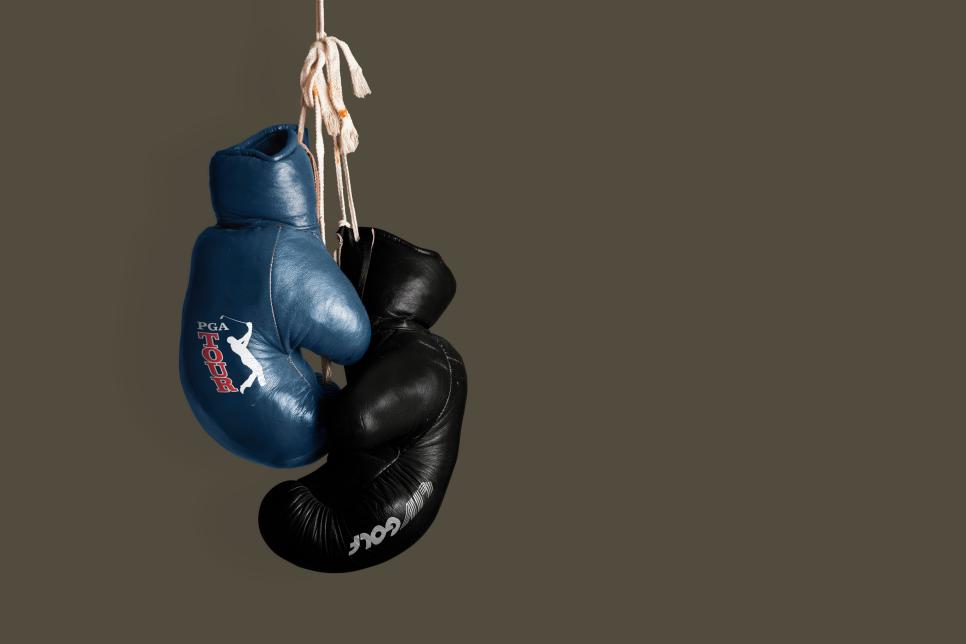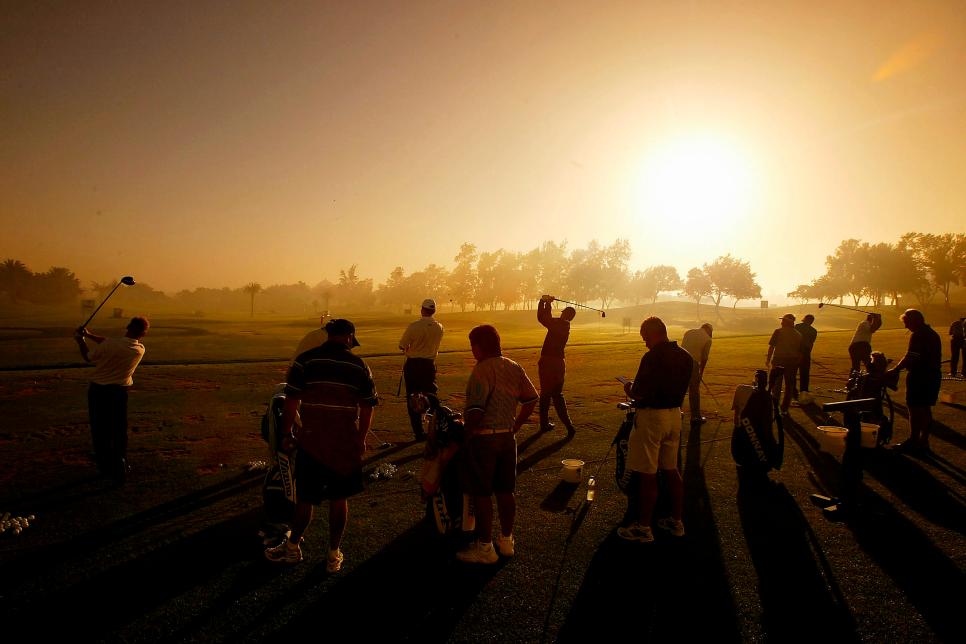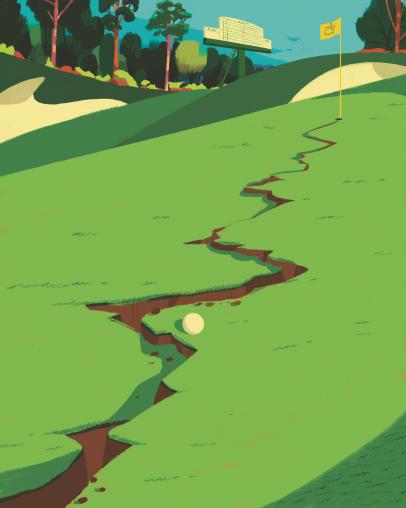The Next One’s Good
How to fix the boxing match that has become pro golf

Jens Tandler / EyeEm
Other pro sports are judged by the size of their fan base, and in that sense, golf will never be a major sport. Eighty-two of the top-100-rated shows on television last year were NFL games; 94 were sports programming, but golf wasn’t even close. The National Dog Show on Thanksgiving has a larger audience than the Masters, and worldwide soccer eclipses American football. The reality check is Cristiano Ronaldo has 547 million followers on Instagram; Tiger Woods has 3.1 million. When we hear pro golfers complain that they don’t make enough money compared to other athletes, we have to laugh.
That brings us to the troubled times of professional golf, the Saudi challenge and the PGA Tour’s response: How did we get where we are and where do we go from here?
The first mistake was the Saudi’s Public Investment Fund hiring Greg Norman as commissioner to spearhead its incursion into golf. Norman was viewed as toxic by all the institutions of the game. He had no interest in compromise. He had a vendetta against the PGA Tour, which had embarrassed him when he tried to launch a similar world tour with Rupert Murdoch in the 1990s. Add to the mix Phil Mickelson, who, devoid of self-awareness, accused the tour of “obnoxious greed.”
The PGA Tour considered it a hostile takeover. I’m reminded of Ted Tinling’s description of tennis star Martina Navratilova: “She goes from arrogance to panic with nothing in between.” The tour’s mistake was in refusing to take a meeting. Every CEO I’ve talked with says the tour should have met with the Saudis. Their PIF was already in golf with a big event on the European DP World Tour. Jack Nicklaus and others were designing courses in the kingdom. The Saudis weren’t banned from world sport. They fielded teams in the World Cup and the Olympics. They were players in the financial markets and real estate. Politically the U.S. looked the other way with fighter jets and oil. Even the way women were treated in that part of the world was ignored in the spirit of “they’ll change eventually.”
What made this different was the enormity of the timing. It came after the murder of journalist Jamal Khashoggi. The visible horror wasn’t like the Russians poisoning a dissident in a dark alley. “Dismemberment isn’t a word you forget,” said one golf bureaucrat. This was hugely ugly. The Saudis had hosted major sporting events and even bought a football club in the Premier League, but owning a pro golf tour was more glaring. (It wasn’t public at the time, but they were rebuffed when the PIF tried to buy Formula 1 last year.) Outside North America, the business world may be less sensitive, but a backlash was waiting to happen here.
More mistakes followed. Both sides defined their motivation in terms of “the good of the game,” which wasn’t true, of course. Then it got nasty among the warring pros. Tees were thrown.

GOLF’S X-FACTOR The game stands apart because of its participants.
David Cannon
In matters of commerce, I often ask myself the question, What would Mark McCormack do? McCormack discovered Arnold Palmer and practically invented the business of golf as its first super agent, but the author of What They Don’t Teach You at Harvard Business School has the benefit of being deceased.
Knowing his genius for taking the money without giving away the store, I think Mark would have looked at the Saudis as an opportunity, not a problem. A suitor was standing at the front door with a couple of billion dollars in a duffle bag. Your fiduciary responsibility was to invite him in for a cup of coffee. The ultimate pragmatist would have slowed down the decision-making, would not have allowed either side to harden their positions and certainly would not have turned it into a Holy War. He would have found a way to go around Norman and deal directly with Mohammed bin Salman or at least the royal family. He would have Henry Kissingered it. First and foremost, he would have asked what the Saudis wanted from golf and found a way to give it to them. What’s the real objective? Sports washing, influence, respect, profit, tourism, a green jacket? Not enough time was spent figuring this out.
To the PGA Tour, McCormack would say there’s no upside to a confrontation with an enemy that has endless resources. Your friends may not be your allies. The four majors will act in their self-interest. The Open Championship or the Masters or the U.S. Open will not side with the tour if it means weakening their events or excluding the top players. The majors will always remain independent, and the game is better for it.
McCormack would not have drawn the battle lines exclusively to benefit the top 20 players in the world. He would not have split the PGA Tour ’s tournaments in two, with the bottom half turned into second-class sponsors. He would have asked, “How can we use this opportunity to do something for the bigger game, not just the most elite players?” The obvious solution would have been women’s golf but probably also included promoting the game internationally. It might not have worked, but the dialogue would have led to something other than lawsuits.
In the end, this whole matter will be resolved because the gravity of capital brings businesses together. Consequences follow, slowly then quickly. From players to administrators to media, resolution affects all the actors.
Ten years from now I have a feeling we’ll ask ourselves why we took it all so seriously. LIV Golf likely won’t be long term, but just wait till sovereign funds start buying NFL franchises.
Golf stands apart because it’s based on active participants, not audiences. The success of the NFL or NBA isn’t rooted in people who play football or basketball. Their fan bases may be much larger, but golf is about people who actually play the game, who have a stake in the outcome.
In this turbulence, the game we play has never been stronger as COVID has taught us to prize our time at home. The World Golf Report, a newly released economic study of the global sales of golf equipment and apparel conducted by Golf Datatech and the Yano Research Institute of Japan, shows the golf business has grown 30 percent since 2019. Participation in America has surpassed 40 million golfers for the first time, according to the National Golf Foundation. The game is at its most diverse—more women (25 percent of all on-course golfers) and people of color (22 percent) are playing. But it’s how we play that is the essential strength of the game: the belief that golf is played with integrity, that we start and end every round with a handshake or fist-bump, and that golfers give back.
Every hacker I know contributes to charity through golf, certainly some more than others, but it’s in the DNA of the game. I saw it first-hand at the AT&T Pebble Beach Pro-Am in February; it’s the most charitable event on the PGA Tour, raising $18 million for local charities this year alone. American golfers overall raise $3.9 billion annually for college scholarships and homeless shelters and every imaginable good cause in between.
The First Tee is golf’s most successful charity primarily because it teaches kids what’s called the nine core values of the game: honesty, integrity, sportsmanship, respect, confidence, responsibility, perseverance, courtesy and judgment. There’s a message here for pro golf that non-golfers might not understand. We not only play the game but actively learn from it. Golf punches above its weight.


